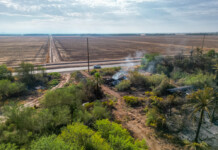
Back when Arizona had just become a state and Pinal County was filled with farmers, ranchers and miners, there was a term people used to describe how deeds were filed: ‘race to the courthouse.’
The term ‘race to the courthouse’ means a first deed, mortgage, lien or judgment filed with the county recorder has priority over later recordings. Arizona is a first recording state.
Today it’s no longer riders on horseback or people racing vehicles to be the first to the county recorder’s office to file a deed. They can do it in just a matter of minutes online.
The Pinal County Recorder’s Office has launched a new online system designed to make filing documents almost instantaneous. A company called Simplifile has an E-Recording system that is already used in many Arizona counties.
“We’ve always wanted to have our own program that will provide an option for our customers to electronically record documents,” said County Recorder Laura Dean-Lytle. “Using this system isn’t going to stop us from implementing our own online recording application, but it will give us a chance to see what works and what needs to be improved upon.”
Dean-Lytle added that Simplifile’s E-Recording is a bargain for the county, only costing $200 a year. The title companies that use E-Recording to send their documents to the county also pay a fee to Simplifile to use the application. The recorder’s office charges a $14 document filing fee for paperwork consisting of five pages or less.
Currently, there are four title companies using E-Recording. Dean-Lytle said that once her office staff becomes more familiar with the application, they will open it up for any title company, affiliated with Simplifile, to utilize.
During an afternoon in the recorder’s office, Dean-Lytle watched as Office Supervisor Deb Smith recorded a document that arrived at her desk from a title company using E-Recording. Once a document arrives through the application, a signal alerts the document processor that a file has arrived for recording. After checking the electronic file for legal formalities, the document is recorded, and the file is placed into the county’s on-base server to be preserved. The entire transaction is done online.
“I think it’s a great application,” the county recorder said. “We talked with other county recorders before purchasing the application. It became a matter of having the technology available at the right price.”
Since its debut on June 2, E-Recording has only amounted to a fraction of the recordings that come through the office every day. But if Pinal County follows the trend that Maricopa County has shown -having 40 percent of their filings completed electronically – staff could be freed up to complete other tasks.
“We will still have to do many of the same tasks that we do now when a document arrives in the office, but it will be online through this system,” Dean-Lytle said. “In the end, it becomes a chance for us to offer speedier service to the public and to use their tax dollars even more wisely.”
File photo








![Maricopa’s ‘TikTok Rizz Party,’ explained One of several flyers for a "TikTok rizz party" is taped to a door in the Maricopa Business Center along Honeycutt Road on April 23, 2024. [Monica D. Spencer]](https://www.inmaricopa.com/wp-content/uploads/2024/04/spencer-042324-tiktok-rizz-party-flyer-web-218x150.jpg)


![City gave new manager big low-interest home loan City Manager Ben Bitter speaks during a Chamber of Commerce event at Global Water Resources on April 11, 2024. Bitter discussed the current state of economic development in Maricopa, as well as hinting at lowering property tax rates again. [Monica D. Spencer]](https://www.inmaricopa.com/wp-content/uploads/2024/04/spencer-041124-ben-bitter-chamber-property-taxes-web-218x150.jpg)




